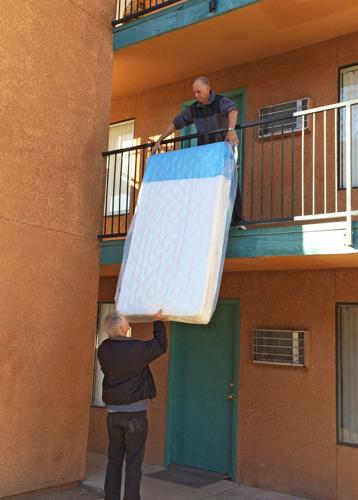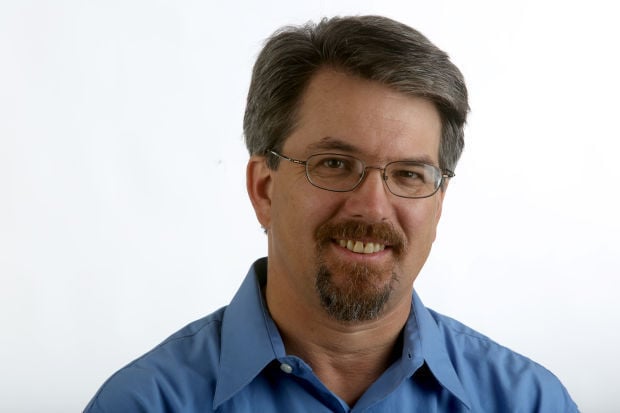They are already among us.
They live in clusters of apartments across Tucson, where several family members are packed into small, crowded spaces.
They speak languages, like Nuer and Tigrinya, that are incomprehensible to outsiders, and many understand little or no English or Spanish. Yet more are coming every month.
After the Nov. 13 terrorist attack in Paris, America sought a threat and settled on refugees. Arizona’s Doug Ducey was among 30 governors who demanded a halt to resettling refugees. The U.S. House of Representatives also voted overwhelmingly to stop the Obama administration from accepting more Syrian and Iraqi refugees, our Rep. Martha McSally voting with the majority.
Not even France has reacted so fearfully: President Francois Hollande, while ordering attacks on Daesh (ISIS) strongholds, also reaffirmed that the country will accept 30,000 more Syrian refugees.
Most of the governors, like Texas’ Greg Abbott and New Mexico’s Susana Martinez, asked for the federal government to stop placing Syrian refugees, specifically, in their states.
Ducey took a more sweeping approach, declaring, “Given the horrifying events in Paris last week, I am calling for an immediate halt in the placement of any new refugees in Arizona.”
Refugees may seem like a natural place to focus after a terrifying attack like the one in Paris. A Syrian passport bearing stamps from the refugee trail in Greece, Serbia and Croatia was found near one of the dead attackers — probably a fake passport, possibly used by a European-national terrorist to return to the EU undetected.
But you shouldn’t jump to the conclusion that means Syrian refugees put us at significant risk.
A minuscule fraction of the refugees that we’ve accepted since the 9/11 terrorist attacks have even been accused of supporting terrorism. A State Department spokesman told the Washington Post that the number of refugees removed from the United States because of terrorism concerns is about 12 out of a total of 785,000. That’s about 1/100 of 1 percent. Three have been formally charged.
More to the point, trying to sneak into the United States as a refugee — not into Europe, but into the USA — is a long, uncertain prospect. In Europe, you just have to make it from Syria, across Turkey to Greece and you’re in.
To get to the United States, you have to:
- Be selected as eligible by the United Nations High Commission for Refugees;
- Have the United States chosen as your destination;
- Get through State Department, Homeland Security and counterterrorism center screenings;
- Pass medical screening;
- Be matched with a resettlement agency;
- Pass a final security check.
Only then, after about a two-year process, might you be admitted to the United States.
In short, getting into the United States is nothing like slipping into the European Union on a crowded boat from Turkey. It would be an extraordinarily inefficient route for a terrorist, especially considering the number of legal U.S. residents who already sympathize with the Islamist cause and could be recruited.
‘Sense of other as the threat’
So why did Ducey and the governors take this stand? The most generous explanation — theirs — is that they consider our safety their top concern and think there are problems with the vetting refugees receive.
Spokesman Daniel Scarpinato told me Ducey “believes that until we have assurances about the screening process, that it makes sense to halt the resettlement of all refugees to make sure that none have connections” to terrorism.
Why all refugees, not just Syrians or Iraqis?
“We needed assurances from federal officials and the White House that the screening of all refugees, given the need for enhanced security, is something we can have trust in,” Scarpinato said.
A less generous but compelling explanation derives from our human psychology. It turns out entire books have been written about terrorism fear and politics, and I spoke last week to two contributors to one of those books, a collection called ”The Psychology of Terrorism Fears.”
David Altheide, a regents professor emeritus of sociology at ASU, said fear has been key to human survival. It helps protect us from real threats. But that’s changed in this hyper-informed age, in which threats to a distant place and people come to us as immediately as threats to ourselves in our immediate surroundings.
“People aren’t making consistent emotional distinctions between what goes on there and what’s going on here,” he said. “It all appears on the little screen.”
Exotic fears also cause an outsize reaction. The threat of an Ebola outbreak, a Daesh terrorist attack, or Mexican drug-cartel incursions may really get our stress hormones flowing, even if they are vanishingly small threats to us compared to more mundane risks. Car crashes, gun deaths, flu outbreaks and mosquito-borne illnesses just don’t shake us the same way.
“It’s the sense of the other — the other is the threat,” Altheide said. “And this is the story that’s been going on for centuries and centuries.”
Daniel Antonius, a clinical psychologist at the University of Buffalo’s school of medicine, said when an attack occurs, this is the pattern that often follows: “You go from fear, being afraid and a loss of control, to a sense of anger to a sense of ‘I want to be in control.’ ”
That, if we’re being generous, is what the governors gave us — a sense that someone is in control and taking decisive action to address our primal fear of the other, even if the actual risk posed by them is tiny.
But there are less generous explanations. One is sheer cynical politics. Americans now and back through history have usually opposed resettling refugees here. Infamously, we denied refugee status to most Jews seeking to flee Nazi Germany before World War II even after Kristallnacht — the infamous “night of broken glass” — made Hitler’s intentions clear.
Bad policies make for good politics
This week on Twitter, Scarpinato, Ducey’s spokesman, asked Arizona reporters to note the opinions of callers and emailers to the governors’ office. About 75 percent favored Ducey’s refugee policy. That could be the explanation for it right there: Bad policies often make for good politics.
It’s also helpful for governors with presidential ambitions to act as if they are commanders-in-chief of their states.
But there is another explanation — sheer ignorance.
I interviewed Scarpinato on Friday, and talked to him in some detail about Ducey’s position on refugees. After hanging up I thought of a question I should have asked: Did Ducey talk with the state’s refugee coordinator, Charles Shipman, or other state refugee-program employees before asking for the halt?
I called Scarpinato twice and asked him via text message but got no response. I called Shipman and I wrote the spokesmen at the Arizona Department of Economic Security, which oversees the refugee program. Nobody responded. My intuition says that Ducey didn’t consult with Shipman or any other employees of the state refugee program. Otherwise they’d answer my question.
Numerous people in Tucson could have filled in the blanks for Ducey about the state’s refugees. Since the first refugees started arriving in the 1970s, this city has developed an impressive infrastructure of agency employees and volunteers who help refugees arrive, settle in, learn the language, learn the culture and gain skills to survive.
We’ve been taking in around 700 refugees a year here lately, mostly from Africa. Ducey would have us reject them all. The Democratic Republic of the Congo (formerly Zaire), Somalia, Iraq, Sudan and Eritrea have been the top source countries. But Soviet Jews were our first refugees.
“We have, for 40 or more consecutive years, been a location the State Department has favored because they know what a good job we do as a community,” Mayor Jonathan Rothschild said.
City has long welcomed refugees
Hundreds — or, more likely, thousands — of Tucsonans have volunteered over the years to help refugees with this process. On Wednesday, I stopped by the Oasis Apartments on Tucson’s north side and happened upon workers for a furniture store loading new mattresses and other furnishings into an apartment for newly arriving refugees.
As more and more refugees moved into the Coronado Heights neighborhood, south of Fort Lowell Road and east of North Stone Avenue, residents like Gary Maskarinec and Bernadette Jilka have pitched in. They formed youth soccer teams made up mostly of refugees and got to know the families.
“For myself, I find that it makes a stronger community in that it’s more diverse and more interesting,” Jilka said. “When I hear this stuff about not allowing refugees in, it’s disheartening.”
She said she’d happily have a couple of hundred Syrian refugees in Coronado Heights. You see, it’s not that refugees pose no risk, but that they pose a manageable risk we are already managing.
For those who actually know refugees, who work with them on a day-to-day basis, who live as neighbors with them, who’ve helped them with the resettlement process, refugees don’t represent an exotic fear. Nor are they a political opportunity.
They’re just people, with needs, neighbors who are already among us.





